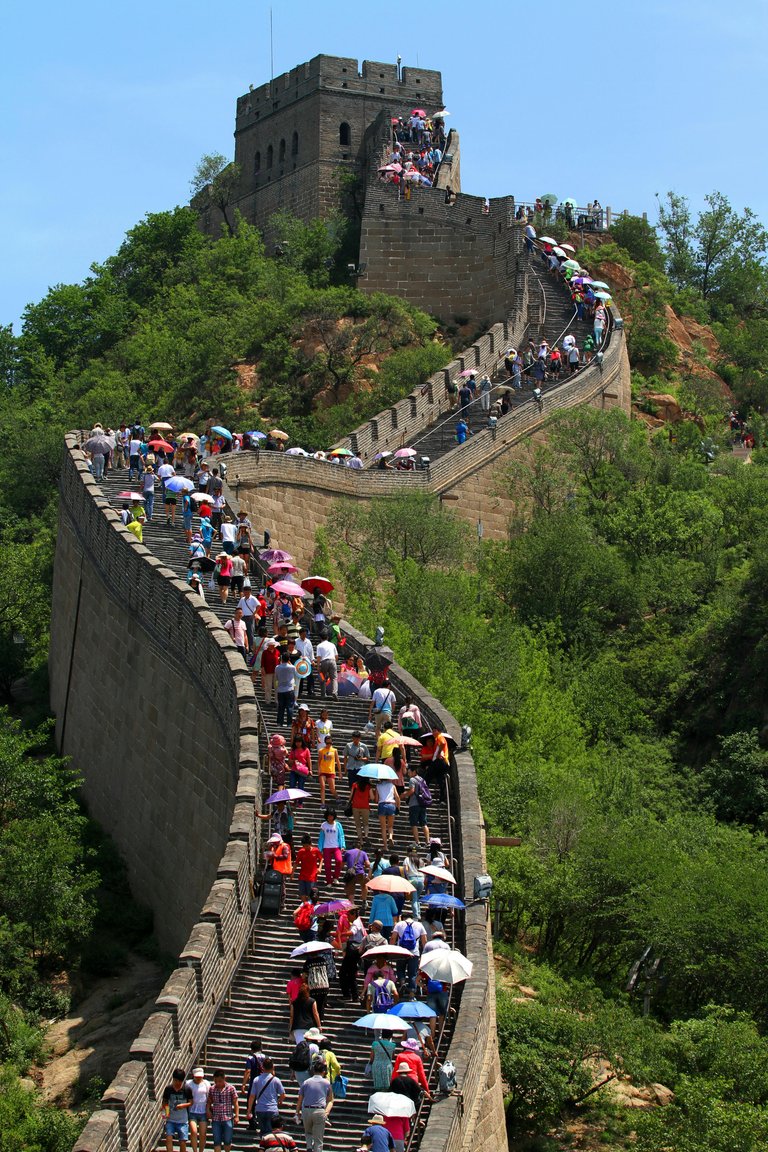In ancient China, there was a mighty emperor named Qin Shi Huang. He was a visionary ruler who wanted to protect his kingdom from the invading nomadic tribes of the north. To achieve this, he decided to build a massive wall that would stretch across the northern border of China. This wall would later be known as the Great Wall of China.
The construction of the Great Wall began in 221 BC and continued for several centuries. It was a monumental task that required the labor of millions of workers, including soldiers, peasants, and prisoners. They toiled day and night, using simple tools and their bare hands to build this colossal structure.

Image link
The Great Wall was not just a physical barrier; it was a symbol of China's strength and unity. It spanned over 13,000 miles, winding through mountains, deserts, and grasslands. It was made of stone, brick, and wood, with watchtowers strategically placed along its length
These watchtowers served as lookout points, allowing soldiers to spot any approaching enemies. As the years went by, the Great Wall grew stronger and more fortified. It became an impenetrable defense system, protecting the Chinese empire from invasions. However, it was not without its challenges. The harsh weather conditions, treacherous terrains, and constant attacks from the nomadic tribes made the construction a difficult and dangerous task.
Despite the hardships, the Chinese people persevered. They believed in the importance of protecting their homeland and were willing to sacrifice their lives for it. The Great Wall became a symbol of their resilience and determination.
Over time, the Great Wall of China became more than just a defensive structure. It became a cultural icon and a testament to the ingenuity and craftsmanship of the Chinese people. It attracted visitors from all over the world, who marveled at its grandeur and historical significance.
Today, the Great Wall of China stands as one of the most iconic landmarks in the world. It is a UNESCO World Heritage Site and a symbol of China's rich history and heritage. It serves as a reminder of the power of human determination and the importance of protecting one's homeland.
Now the belief that the Great Wall of China is visible from space is a classic example of a widely accepted misconception. This misconception likely originated from a misinterpretation of statements made by early astronauts who observed various man-made structures from space. While some astronauts have reported seeing certain large-scale structures, such as cities or highways, the Great Wall is not one of them.
Yang Liwei's statement during his space mission in 2003 debunked the myth. He clarified that the Great Wall is not visible to the naked eye from space. The wall is only a few meters wide, making it difficult to discern from such a distance.
Additionally, the color and material of the wall blend with the surrounding landscape, further reducing its visibility. This revelation served as a reminder of the importance of fact-checking and verifying information. It highlighted that even widely accepted facts can sometimes be incorrect or based on misconceptions. It is crucial to critically evaluate information, especially when it comes to widely held beliefs, and seek reliable sources to confirm or debunk them. The incident with the Great Wall also emphasized the need for scientific exploration and research to provide accurate information. It demonstrated that firsthand experiences and observations can challenge long-standing beliefs and contribute to a better understanding of the world around us.
The misconception that the Great Wall of China is visible from space was debunked by astronaut Yang Liwei in 2003. This revelation prompted people to question other commonly accepted facts and highlighted the importance of fact-checking and verifying information before accepting it as true.
Thanks for reading, bye see you in my next post.
!LOLZ
lolztoken.com
He could never reach the city limit.
Credit: reddit
@paschal1, I sent you an $LOLZ on behalf of memess
(7/10)
Delegate Hive Tokens to Farm $LOLZ and earn 110% Rewards. Learn more.
Now this, i had to find out for myself because i had read a lot about the great wall and i was interested to know which of the sayings were actually factual or fabricated. thanks for this